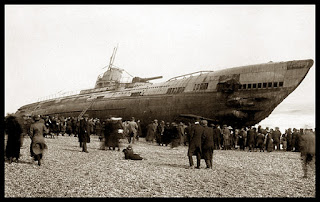After nearly three years of horrific, industrialized war raging across Europe… On April 6, 1917, two days after the U.S. Senate votes 82 to 6 to declare war against Germany, the U.S. House of Representatives endorses the decision by a vote of 373 to 50 the United States Entered the War to end all Wars…
In February 1917, Germany, determined to win its war of attrition against the Allies, resumed its policy of unrestricted submarine warfare in war-zone waters. Three days later, the United States broke diplomatic relations with Germany; the same day, the American liner Housatonic was sunk by a German U-boat. On February 22, Congress passed a $250 million arms-appropriations bill intended to ready the United States for war. In late March, Germany sank four more U.S. merchant ships, and on April 2, President Wilson went before Congress to deliver his famous war message. Within four days, both houses of Congress had voted in favor of a declaration of war.
No one could have foreseen the savagery unleashed by the world’s first industrialized war, where the efficiency of modern killing machines surpassed anything imagined in past European conflicts. On the battlefield, 19th-century tactics soon proved useless against 20th-century weapons. Terrorizing the ground, machine guns had a firepower that equaled 80 rifles. Advances in artillery rained down explosives on soldiers in the trenches. Armored cars and tanks first rolled their way into battle in World War I. Chemical warfare, in the form of chlorine, mustard gas, and phosgene, poisoned hundreds of thousands of soldiers.
The Germans attacked Verdun in late February 1916, and for eight interminable, inhumane months, the siege dragged on. Always intent on perfecting its chemical warfare techniques, Germany had lobbed phosgene gas at the Allies during the siege; once in the lungs, the deadly compound turned to hydrochloric acid, burning men from the inside.
Meanwhile, the British had developed their own new weapon—the tank. And in early summer, during their tragic and misbegotten Somme offensive, tanks rolled onto the battlefield for the first time—to little avail. It took the British and French until November to advance seven miles along the northwestern front, and it cost them more than 620,000 casualties. By the time the French finally broke through at Verdun a month later, they had suffered close to 400,000 casualties and the Germans 350,000.
The Battle of the Somme revealed the horrific nature of modern warfare: immovable trenches, heavy artillery, and massive casualties. The United States was unprepared for the kind of war that its allies had been fighting for nearly three years.
Meanwhile, the British had developed their own new weapon—the tank. And in early summer, during their tragic and misbegotten Somme offensive, tanks rolled onto the battlefield for the first time—to little avail. It took the British and French until November to advance seven miles along the northwestern front, and it cost them more than 620,000 casualties. By the time the French finally broke through at Verdun a month later, they had suffered close to 400,000 casualties and the Germans 350,000.
The Battle of the Somme revealed the horrific nature of modern warfare: immovable trenches, heavy artillery, and massive casualties. The United States was unprepared for the kind of war that its allies had been fighting for nearly three years.
July 1, 1916, west of the Somme River, northern France: In the dawn light, British and French artillery opened up, firing nearly a quarter million shells on the enemy’s entrenched positions—the final barrage before the “Big Push.” At 7:30, the first Allied officers, the great majority British Expeditionary Force, led their men out of the trenches and “over the top.” After eight days of bombarding German forward positions, they expected to advance across no-man’s-land virtually unopposed, so they were surprised to see German barbed wire still in place. Still, they kept moving forward. Then, a hundred yards from the enemy line, they were mowed down by the Germans, whose deep concrete bunkers and machine guns had remained virtually unscathed. The day remains the single bloodiest in the history of the British Army: almost 60,000 men killed or wounded, many officers in the first hour. The battle continued for another 140 days along a 15-mile front and claimed some 1.3 million casualties.
Hervey Allen, a junior infantry officer serving on the western front later wrote. Before the year was out, some two million of these brave American soldiers would be fighting in the United States’ first major international war—to its bloody end.
The Protocol for the Prohibition of the Use in War of Asphyxiating, Poisonous or other Gases, and of Bacteriological Methods of Warfare, usually called the Geneva Protocol, is a treaty prohibiting the use of chemical and biological weapons in international armed conflicts. It was signed at Geneva on 17 June 1925.
The Chemical Weapons Convention (CWC) is an arms control treaty which outlaws the production, stockpiling, and use of chemical weapons and their precursors.
There was a reason why gas attacks were banned so long ago...
The brutality of this war on mankind was supposed to be the war to end all wars...
Never forget what mankind has already gone through...
The brutality of this war on mankind was supposed to be the war to end all wars...
Never forget what mankind has already gone through...
We can all do better...
Don't give up on #PeaceforallMankind ...



































